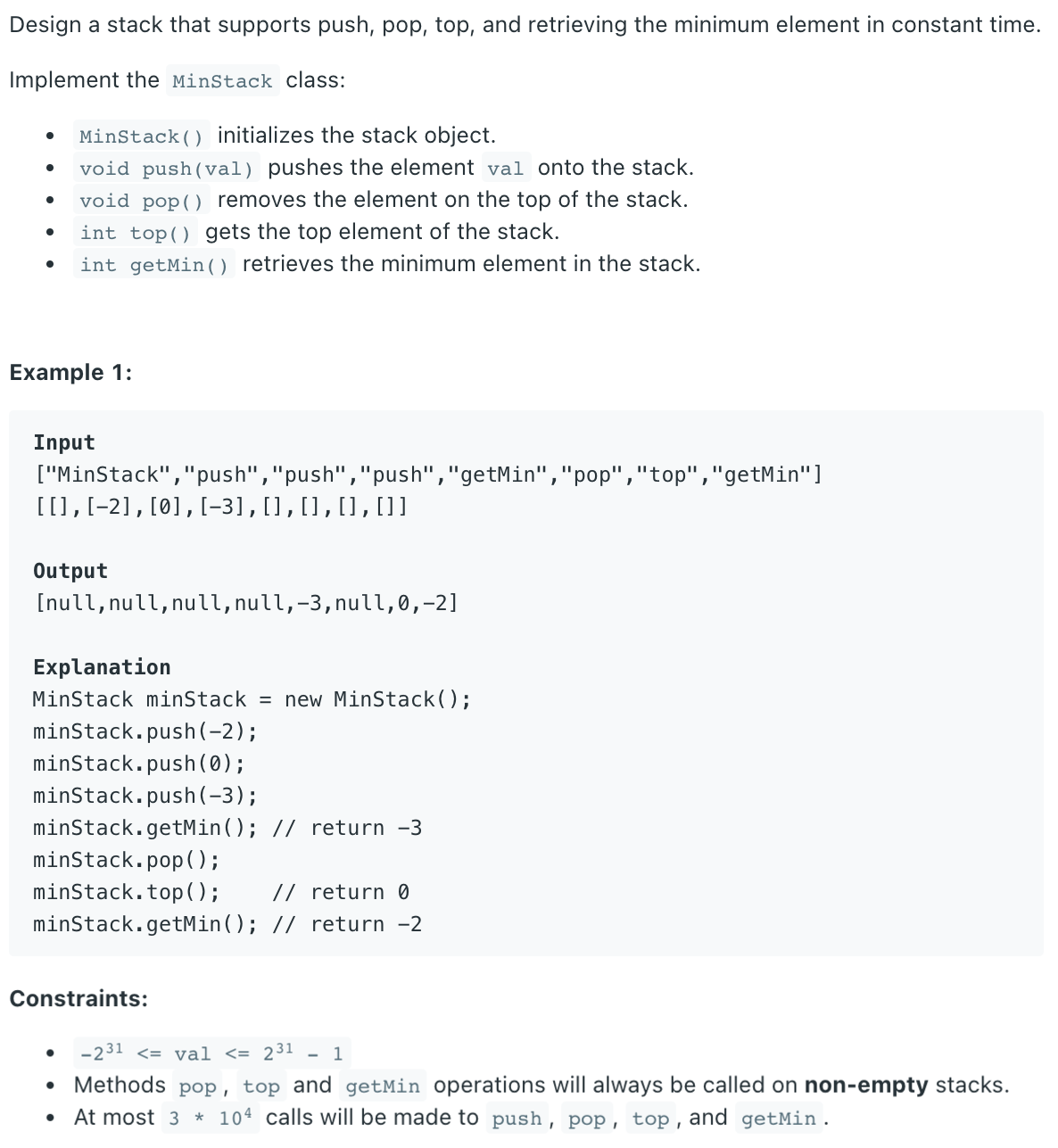Min Stack

See the harder related problem Max Stack.
# Driver Code
obj = MinStack()
obj.push(val)
obj.pop()
param_3 = obj.top()
param_4 = obj.getMin()
2
3
4
5
# Solution
Note the requirement in the prompt: constant time. So need to come up w/ getMin in time.
Complexity
time: for all operations
space:
# Stack of val min Pairs
Since current_min is only the minimum seen below current elt and never above, we could store the value/minimum pair into the stack. Note the not self.stack base case.
class MinStack:
def __init__(self):
self.stack = []
def push(self, x: int) -> None:
# base case
if not self.stack:
self.stack.append([x,x])
return
current_min = self.stack[-1][1]
self.stack.append([x,min(current_min,x)])
def pop(self) -> None:
self.stack.pop()
def top(self) -> int:
return self.stack[-1][0]
def getMin(self) -> int:
return self.stack[-1][1]
2
3
4
5
6
7
8
9
10
11
12
13
14
15
16
17
18
19
20
# Two Stacks
Since the minimums would have many duplicates, we could instead use the self.min_stack to store the minima.
Note that we should also store when x equals current min. Consider this case: self.stack is [2,1,1]. If we don't store the 2nd 1 to self.min_stack, getMin on [2,1] would be 2.
class MinStack:
def __init__(self):
self.stack = []
self.min_stack = []
def push(self, x: int) -> None:
self.stack.append(x)
# should also store when x equals current min
if not self.min_stack or x<=self.min_stack[-1]:
self.min_stack.append(x)
def pop(self) -> None:
if self.stack[-1]==self.min_stack[-1]:
self.min_stack.pop()
self.stack.pop()
def top(self) -> int:
return self.stack[-1]
def getMin(self) -> int:
return self.min_stack[-1]
2
3
4
5
6
7
8
9
10
11
12
13
14
15
16
17
18
19
20
21
# Improved Two Stacks
We could further improve the two stacks solution by combining the duplicates into a count.
Note that self.min_stack stores the [minimum, count] pairs.
class MinStack:
def __init__(self):
self.stack = []
self.min_stack = []
def push(self, x: int) -> None:
self.stack.append(x)
if not self.min_stack or x < self.min_stack[-1][0]:
self.min_stack.append([x,1])
elif x == self.min_stack[-1][0]:
self.min_stack[-1][1]+=1
def pop(self) -> None:
if self.stack[-1]==self.min_stack[-1][0]:
if self.min_stack[-1][1]>1:
self.min_stack[-1][1]-=1
else:
self.min_stack.pop()
self.stack.pop()
def top(self) -> int:
return self.stack[-1]
def getMin(self) -> int:
return self.min_stack[-1][0]
2
3
4
5
6
7
8
9
10
11
12
13
14
15
16
17
18
19
20
21
22
23
24
25